Today's an auspicious day for the dark side: John Wilkes Booth (1838-1865), James Earl Ray (1929-1998) and Mark David Chapman (52) were all born on May 10. In 1865, Booth shot and killed President Abraham Lincoln, who was attending a performance at Ford's Theatre. Ray took the life of Martin Luther King, Jr., in 1968, as King stood on a hotel room balcony in Memphis, TN. And in 1981, Chapman murdered John Lennon as Lennon arrived at his home in NYC
http://www.answers.com/
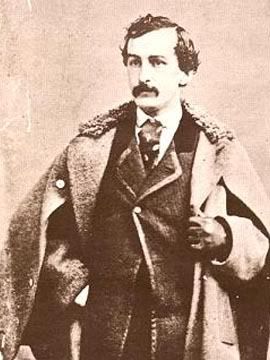
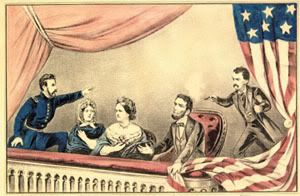
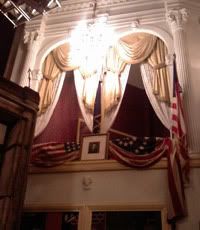
(May 10, 1838 – April 26, 1865) was an American actor from Maryland, who fatally shot U.S. President Abraham Lincoln at Ford's Theatre in Washington, DC on April 14, 1865. Lincoln died the next day from a single gunshot wound to the head – the first American President to be assassinated.
Booth was a successful professional stage actor of his day and a member of the prominent Booth family of actors. He was also a Confederate sympathizer who expressed vehement dissatisfaction with the South's defeat in the Civil War and Lincoln's proposal to extend voting rights to freed slaves.
Booth and a group of co-conspirators led by him planned to kill Lincoln, Vice President Andrew Johnson, and Secretary of State William Seward in a desperate bid to help the tottering Confederacy's cause. Although Robert E. Lee's Army of Northern Virginia had surrendered four days earlier, Booth felt that the war was not yet over because Confederate General Joseph Johnston's army was still fighting Union Army General Sherman. Of the conspirators, only Booth was successful in carrying out his part of the plot.
Following the shooting at Ford's Theater, Booth fled by horseback to southern Maryland and eventually to a farm in rural northern Virginia, where he was tracked down and killed by Union soldiers two weeks later. Several of the other conspirators were tried and hanged shortly thereafter.
http://en.wikipedia.org/wiki/John_Wilkes_Booth
http://www.biography.com/search/article.do?id=9219681
Actor and assassin, born near Bel Air, Maryland, USA. A member of the well-known Booth family of Shakespearean actors, he was a somewhat erratic, if popular actor. He had come to support slavery and the South, and as a member of a Virginia militia company had participated in the arrest and execution of John Brown (1859). In the autumn of 1864 he hatched a plot to kidnap Lincoln, but the scheme failed. He then concocted a plot to assassinate Lincoln, vice-president Andrew Johnson, and secretary of state William Seward. Booth's co-conspirators failed in their attempts on Johnson and Seward, but Booth shot Lincoln in Ford's Theatre (14 Apr 1865) before jumping to the stage and allegedly crying out, ‘Sic semper tyrannis! The South is avenged!’ He was located and killed 12 days later, although it is not certain whether he was killed by his captors or died by his own hand. Rumours inevitably persisted for years that he had escaped.
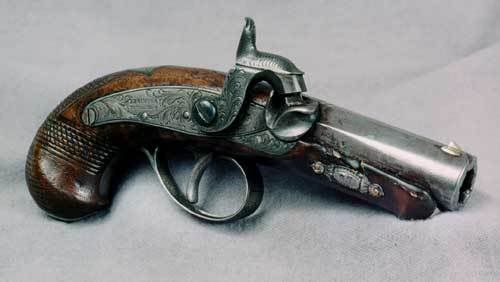
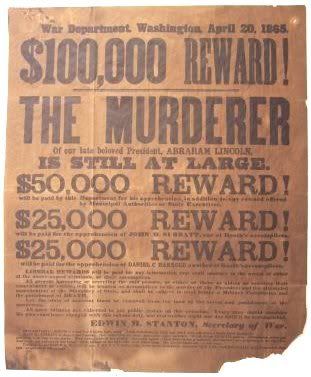
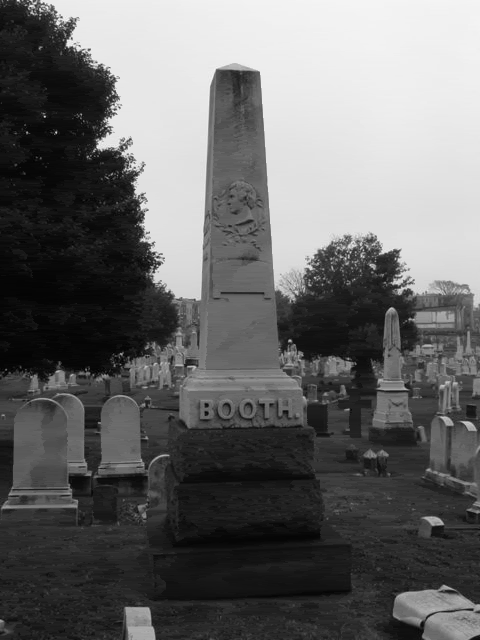
After the shot
http://www.radionetherlands.nl/specialseries/global_perspective_2007/070413gp
On the night of 14 April 1865, in front of a thousand people at Ford's Theatre in Washington DC, actor John Wilkes Booth assassinated President Abraham Lincoln. Twelve days later Booth himself was shot dead in a barn in the nearby state of Virginia.
Conspiracy theories surrounding the assassination have flourished ever since.
The term conspiracy theory was not actually coined until the early 20th century. It was popularized in the 1960's after the assassination of President John F. Kennedy. Since then conspiracy theories have been applied to everything from AIDS to 9/11. They have also become a widespread cultural phenomenon in books and films.
Sign of paranoia
"The rise in conspiracy thinking has usually been seen by academics as a sign of popular paranoia in those on the margins of society," explains Peter Knight, a senior lecturer in American Studies at the University of Manchester who has written extensively on the subject.
"Often people believe in a conspiracy when no other explanation seems to fit the bill," Knight says, "particularly when trying to work out the exact linkages of blame and causation in a globally connected world."
He notes that Americans seem to have a "special affinity" to conspiracy theories because their belief in the power of individualism is closely linked to their fear of anything which threatens the individual. In other words, they have developed a deep distrust of anything official - especially the government.
Lack of trust in government
Knight sites opinion polls in the early 1960s which showed three-quarters of Americans trusted the government. By the 1990s only a quarter claimed such trust.
After shooting President Lincoln, John Wilkes Booth leapt to the stage of the Ford Theatre shouting 'Sic semper tyrannis' - 'Thus always to tyrants.' Booth believed that he was striking down a tyrant as surely as Brutus struck down Caesar. Historian Michael W. Kauffman is author of "American Brutus" a book about the Lincoln assassination:
"When Marcus Brutus joined the conspiracy against Julius Caesar, he was said to have done it for purely patriotic reasons: trying to restore the liberties of his people by getting rid of a tyrant. And Marcus Brutus was a hero in the Booth family. They all felt, one generation after another, that the way to deal with a tyrant is to kill him."
Questions remain
More than 140 years after Booth shot Lincoln conspiracy theories are still very much alive for both historians and ordinary people. Some believe Booth was the ring leader of a small group; others are convinced he was simply a pawn in a plot planned by the president's secretary of war. Some believe it wasn't really Booth who died in that Virginia barn.
Soundprint Producer Jean Snedegar tries to unravel the truth and a myriad of legends about the assassination of a great American president.
Mark David Chapman (born 10 May 1955) is an American man who notoriously shot and killed musician John Lennon on December 8, 1980. He remained at the scene until arrested and claimed the book The Catcher in the Rye would explain his perspective and motivation. Chapman was allowed to plead guilty to second degree murder before his trial began and, despite being assessed as delusional and possibly psychotic, he was sentenced to 20 years to life. He has been denied parole four times amidst campaigns against his release, and remains incarcerated at Attica Correctional Facility.http://en.wikipedia.org/wiki/Mark_David_Chapman
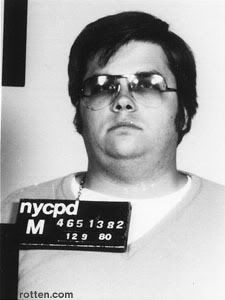
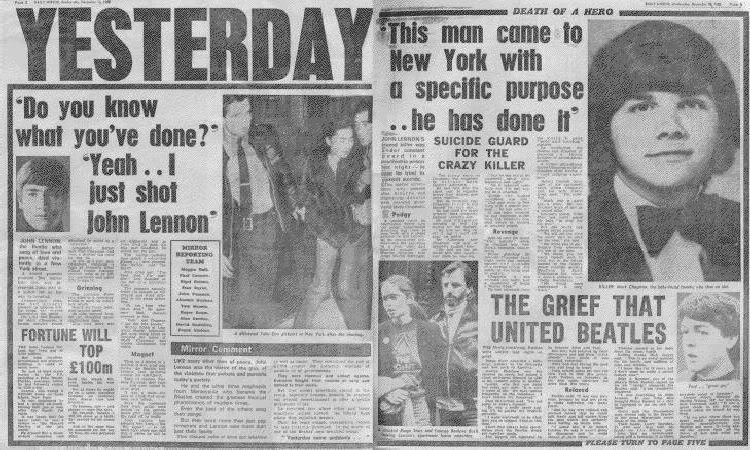
http://www.biography.com/search/article.do?id=9244472
US convicted murderer. A security guard from Hawaii, he shot and killed former Beatles member John Lennon outside Lennon's apartment in Manhattan (8 Dec 1980). Much attention was paid at Chapman's trial to his psychiatric state, as his lawyer initially entered a plea of insanity which Chapman later overturned with a plea of guilty. He was found guilty of murder, sentenced to life imprisonment, and ordered to receive psychiatric treatment.
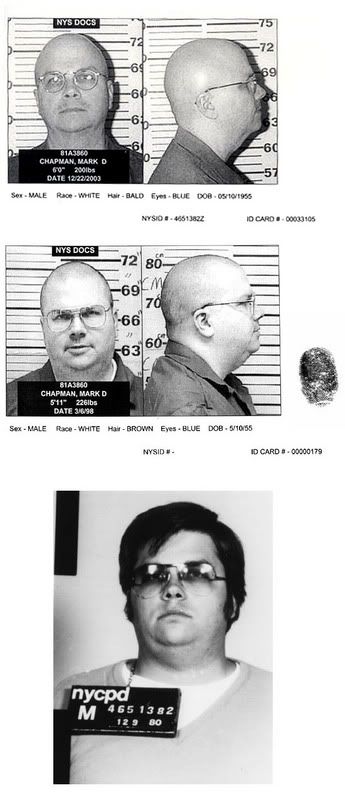
John Lennon killer 'wanted fame'
http://news.bbc.co.uk/2/hi/entertainment/3745492.stm
John Lennon's killer Mark Chapman shot the former Beatle because he wanted to "steal" his fame, he told a recent parole board hearing.
Chapman, 49, said in some ways he had achieved his goal, according to a transcript released on Thursday.
But in other ways, "I'm a bigger nobody than I was before", he said.
Chapman has been in jail since shooting Lennon in New York in 1980. His third parole application was turned down earlier this month.
"People hate me now instead of, you know, for something positive. So that's a worse state," he said in the 5 October interview.
He said he deserved nothing "because of the pain and suffering I caused, I deserve exactly what I've gotten right now".
He also revealed he planned the killing for three months and considered murdering other celebrities who he thought were "phonies".
He also travelled to New York to kill Lennon once before, but did not go through with it, he said.
After that aborted attempt, he went to Hawaii - where he found a book containing photographs of the musician.
"It just angered me. You know, here I was with these struggles," he said.
Chapman expanded on his reasons for the shooting by saying: "It was just a tremendous compulsion of just feeling this big hole.
"Of being what I thought was a big nobody, a big nothing, and I couldn't let it go. And it just kept going very strongly, and I couldn't stop it."
It was previously believed that Chapman dropped his gun straight after the shooting, but he revealed he was tackled by a doorman.
"I didn't drop it. I stood there and held it in my hand," he said.
"And the doorman, Jose, came over and he said, 'What have you done, what have you done?'
"He grabbed my hand and he shook it, and he shook the weapon out of my hand, and he kicked it across the asphalt about thirty feet away.
"Pretty brave man to do that. But that's what he did."
'Traumatic'
He said he remembered Lennon's wife Yoko Ono walking up to the police car where he was sitting after his arrest, and looking at him but saying nothing.
"That was a very traumatic thing that I blocked out of my memory for several months," he told the board.
The parole board said it did not release him because of the "extreme malicious intent" he had shown.
The board told Chapman he had "a clear lack of respect for life" and subjected Lennon's widow Yoko Ono to "monumental suffering by her witnessing the crime".
James Earl Ray (March 10, 1928 – April 23, 1998) was convicted of the assassination of civil rights leader Dr. Martin Luther King, Jr., which occurred on April 4, 1968 in Memphis, Tennessee. Ray also has the distinction of having been twice placed on the FBI Ten Most Wanted Fugitives list.
http://en.wikipedia.org/wiki/James_Earl_Ray
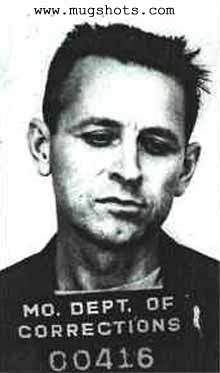
Assassin, born in Alton, Illinois, USA. He served in the US Army (1946–8) and was imprisoned for armed robbery (1960–7). He escaped (1967) and shot and killed Martin Luther King Jr in 1968, and the next year was sentenced to 99 years in prison. Although few doubted he had fired the fatal shot, many questioned whether he acted alone.
http://www.biography.com/search/article.do?id=9452756
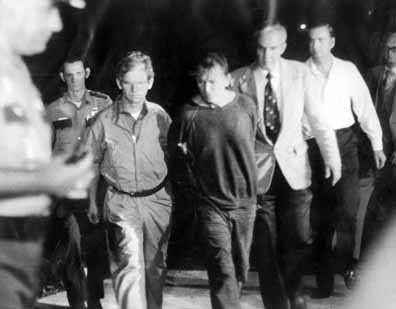
James Earl Ray: Timeline
CBS) Here is a list of key dates in the life of James Earl Ray as compiled by The Tennessean:
http://www.cbsnews.com/stories/1998/04/23/national/main7878.shtml
March 10, 1928: James Earl Ray is born in Alton, Ill.
December 1948: Ray leaves the Army with a general discharge.
December 1949: Ray arrested for first time on a burglary charge in California, serves three months.
April 1967: Ray escapes from Missouri State Prison, where he's serving 20 years for armed robbery.
April 4, 1968: The Rev. Martin Luther King Jr. is assassinated on the balcony of the Lorraine Motel in Memphis.
June 8, 1968: Ray is arrested at London's Heathrow Airport.
March 10, 1969: Ray pleads guilty to murdering King and is sentenced to 99 years in prison.
March 13, 1969: Ray recants.
June 10, 1977: Ray escapes from Brushy Mountain State Prison with five other inmates.
June 13, 1977: Ray recaptured.
Aug. 16, 1978: Ray testifies before the House Select Committee on Assassinations.
Oct. 13, 1978: Ray and courtroom artist Anna Sandhu marry.
Dec. 30, 1978: The committee concludes that Ray acted alone but there was circumstantial evidence of a conspiracy.
Aug. 10, 1979: The Revs. Jesse Jackson and James Lawson meet with Ray and his attorney, Mark Lane, for 2-1/2 hours and conclude they do not believe Ray killed King.
Nov. 9, 1979: Ray escapes again from Brushy Mountain and recaptured the same day.
June 4, 1981: Ray is stabbed by black inmates.
June 17, 1981: Ray is transferred to the Tennessee State Penitentiary in Nashville for his safety.
Nov. 25, 1991: Ray's book, Who Killed Martin Luther King? The True Story of a Convicted Assassin, goes on sale.
March 3, 1993: Ray is granted a divorce from his wife of 14 years.
April 4, 1993: A mock jury acquits Ray in Guilt or Innocence: The Trial of James Earl Ray, a production televised by HBO.
May 6, 1993: Gov. Ned McWherter turns down a request by Ray's attorney William Pepper that Ray be exonerated and the investigation into King's death be reopened.
December 1993: Former Memphis restaurateur Loyd Jowers says he paid laborer Frank Holt to shoot King. Jowers says he was paid "a large sum of money" by Memphis producer dealer Frank C. Liberto to find someone to kill King.
January 1994: Ray's lawyers try to overturn his murder conviction on the basis of "newly discovered evidence" of a plot to kill King., but Shelby County prosecutors say the new evidence was too late.
May 1994: The parole board refuses Ray's parole request and tells him to renew it again in 5 years.
October 1994: Ray sues state Board of Paroles, charging members conspired with unnamed state and federal officials to keep him in prison.
May 1995: The state Supreme Court denies Ray's appeal of a 1994 Criminal Appeals ruling to test-fire the murder weapon and examine other evidence. The appellate court ruled Ray has exhausted his lega remedies, and that test-firing the weapon would endanger evidence.
December 1996: Prison officials transfer Ray from Lois DeBerry Special Needs Facility to Columbia Nashville Memorial Hospital for treatment for liver failure, beginning a series of trips to the hospital.
February 1997: King family supports Ray's effort to get a new trial. King's son Dexter says he thinks there was a conspiracy to kill his father, and that Ray did not act alone. Ray also wins a first step toward getting a trial.
March 1997: In a meeting, Ray tells King's son Dexter that he did not kill the civil rights leader. King says he believes Ray.
May 14, 1997: The testing of Ray's rifle begins.
May 24, 1997: Prison officials reject Ray's request to be evaluated at a Pittsburgh hospital as a liver transplant recipient.
June 9, 1997: Davidson County Chancellor Irvin Kilcrease rules that state law does not permit Ray to be sent out of state to be evaluated for a liver transplant.
April 23, 1998: James Earl Ray dies of cirrhosis of the liver at age 70 in a Nashville prison facility.
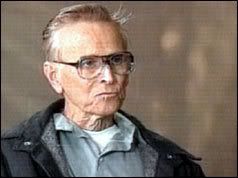
Autopsy confirms Ray died of liver failure
http://www.cnn.com/US/9804/24/ray.autopsy.pm/index.html
NASHVILLE, Tennessee (CNN) -- An autopsy Friday confirmed that James Earl Ray, the confessed assassin of Martin Luther King Jr., died from the failure of multiple internal organs due to cirrhosis of the liver, which was caused by a chronic hepatitis infection.
Ray, who confessed to King's murder, then recanted, had sought a trial for nearly 30 years for the 1968 assassination of the civil rights leader. He died Thursday at the age of 70 from kidney failure and complications from liver disease that had repeatedly sent him to prison hospitals over the past 16 months.
Tennessee state law requires an autopsy for any inmate who dies in custody.
Dr. Bruce Levy, Nashville's chief medical examiner, said that the autopsy, which lasted about 90 minutes, was routine and the findings "consistent with what we expected based on Ray's medical history."
More tests were planned to determine what type of hepatitis Ray had, Levy said, potentially allowing examiners to speculate on where and when he might have contracted the disease.
There are few treatments for hepatitis, Levy noted. "You have to treat the symptoms and allow the disease to follow its course."
King family invited to funeral
Although funeral arrangements were pending, King's family has been invited to a private memorial service for Ray, Ray's brother Jerry Ray said Friday. Within the past two years, the King family had joined the effort to win Ray a trial, saying they believed there was still a hidden conspiracy surrounding the civil rights leader's death.
There was no immediate word on whether the King family would attend the memorial service, being arranged by Ray attorney William Pepper.
But King's widow, Coretta Scott King, and other family members said Thursday they were saddened by Ray's death and the fact that the country "will never have the benefit of Mr. Ray's trial, which would have produced new revelations about the assassination."
Ray was to be cremated and his ashes flown to Ireland, home of his family's ancestors.
Jerry Ray
Ray's survivors include seven brothers and sisters. Jerry Ray told CNN on Friday that his brother didn't want to be buried or have his final resting place in the United States, because of "the way the government has treated him.
Ray family had autopsy observer
The autopsy, performed by Levy, was observed by Dr. Cyril Wecht, a forensic pathologist from Pittsburgh.
Wecht, known for making controversial comments on several high-profile deaths -- including the assassination of President John F. Kennedy -- attended the autopsy at the request of Ray's family and Pepper.
Wecht said Ray died of hepatitis and that an autopsy may seem unnecessary. But Ray's family wants to know what type of hepatitis it was, when Ray got it and whether he received appropriate medical treatment.
Further autopsy results also may determine whether Ray could have successfully undergone a liver transplant, "which would have been available for him in Pittsburgh, but Tennessee authorities said no," Wecht said Thursday.
Prior to the autopsy, Levy told CNN he appreciated "the opportunity for another independent forensic pathologist to come in and to hopefully put to bed any rumors about any kind of controversy or conspiracy about Mr. Ray's death.
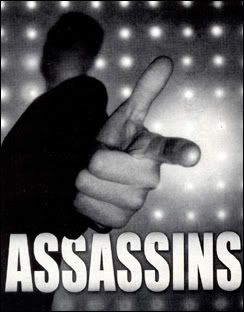
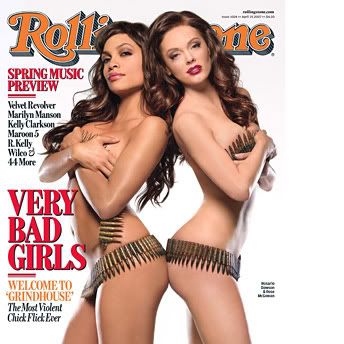











![Brotherhood" (2006) [TV-Series]](http://photos1.blogger.com/x/blogger2/1421/379621144723082/211/z/425926/gse_multipart33129.jpg)







No comments:
Post a Comment